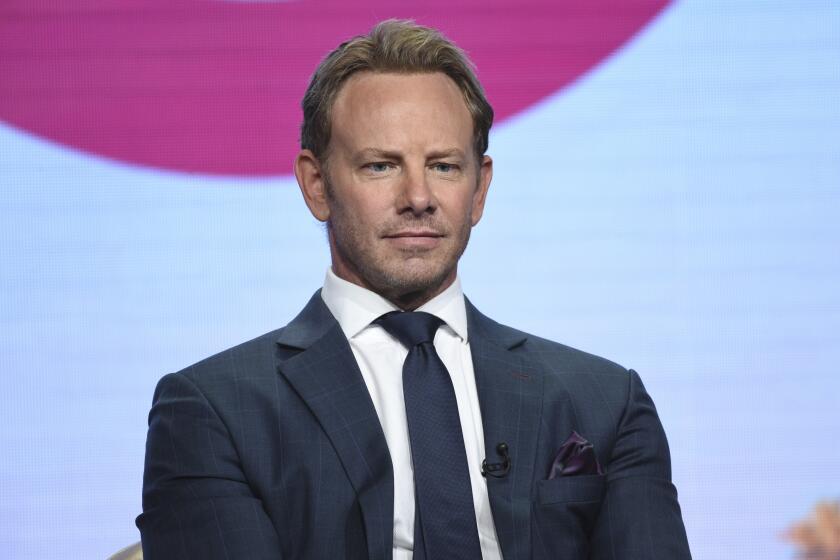Defending Jackson, Oprah Coverage
C’mon, Howard Rosenberg. Can you honestly say your shrill and inaccurate ranting on television news coverage of Michael Jackson’s whereabouts serves your readers (“Michael Vanishes, So Does Judgment,” Calendar, Nov. 19)?
In case anyone forgot, I am the journalist Rosenberg labeled “media worm” and “intrepid celebrity snoop” who also “fronted Channel 4’s cynically hollow series on Oprah Winfrey.” A simple telephone call to check the information would have revealed I was more than a front for the series. I helped conceptualize it, conducted the majority of interviews, wrote the copy and supervised its editing.
I stand by my work. The five-part series was neither cynical nor hollow, but a sincere attempt to examine the success of a daytime talk-show phenomenon.
What’s more, KNBC-TV ought to be praised for being objective enough to do the series; Oprah airs on our competition. Yes, I think the decision to do the series was partly the result of a desire to attract Oprah’s fans to our station, but there is another factor in all of this. I believe the news managers at KNBC-TV when they tell me they are committed to covering the impact of mass media. That’s why they hired me.
Since joining the staff, I have done stories on everything from the impact of celebrity endorsements on product sales to the treatment of women in the Hollywood power structure. I continue to view the Oprah assignment as proof of the station’s commitment to honestly examine stories about media in our viewing area.
Actually, “cynical and hollow” could as easily refer to Rosenberg’s piece lampooning coverage of Michael Jackson.
To dismiss all coverage of Michael’s whereabouts as “ludicrous, scummy and excessive” is simplistic and inaccurate. As Rosenberg noted, you may not care about the story, but millions of Michael’s fans and detractors do.
He is, arguably, the biggest music star in the world; certainly one of the wealthiest and most powerful. Right now, he is suspected of child abuse. That’s news.
*
If we are to believe his attorneys, Michael is suffering from an addiction to prescription painkillers. The fact that he is seeking treatment outside the United States raises legitimate and understandable questions about his return here in the event charges are filed. That’s news, as well.
When I received the assignment, I welcomed it. It’s a huge story and especially so in this town, where so many careers are tied to Michael’s fortunes.
To criticize local television news content without putting it in the context of the marketplace forces that shape it is to do a disservice to your readers. Local television news looks the way it does because of the tremendous pressure news executives face in attracting viewers. News is no longer viewed by the industry as a “loss leader.” In the last 25 years, intense competition has driven content selection and program formatting within newscasts. A body of research has shown that shorter, more visual stories tend to attract and hold viewers.
My own curriculum in graduate school last year at USC’s Annenberg School for Communication ought to tell you something. The courses have names like “Economics of Communications” and “Communication Systems and Competitive Advantage.” To criticize newscast content and spin and not even mention the competitive forces that drive it is to abandon the responsibility of a true social critic.
Given the competitive situation in this market, there is no way a news manager could ignore or downplay the Jackson story and hold on to viewers. Rosenberg’s suggestion that NAFTA is a more important story to viewers, and should have led local newscasts that day, is ridiculous. I can hear it now: (Housewife in Tustin Calling Out to Her Husband in the Back Yard) “Honey, quick, come look at the TV. They’re doing a story about NAFTA!” (Don’t give up your day job, Howard.)
As long as television stations look to their news departments to generate profits, marketplace forces will affect news judgments. That’s the way it is. That is not to say we must limit our coverage to stories that “sell”; only that in selecting stories we must always keep viewers’ interests in mind. It does no good to air a daily newscast of great intellectual achievement if no one is watching.
Perhaps a more useful subject for Rosenberg to write about is the FCC’s abdication of regulatory responsibility in overseeing the longstanding requirement that U.S. television stations serve the public interest, convenience and necessity. That commitment was mandated in the Federal Communications Act of 1934.
*
To a large extent, we can thank the Reagan Administration for the deterioration, which occurred when the FCC permitted widespread ownership changes (frequently through leveraged buyouts), often resulting in reduced staffs and services with little regard for the impact on communities involved. The longstanding buffers between news departments and the “bottom line” are dissolving.
From all appearances it seems the fierce competition for viewers will only increase. Howard will see other things that horrify him. My advice to him: Don’t just sit there and fume. Do something about them! Lobby for regulatory changes that would remove local TV news from the ratings game.
I agree with Rosenberg that there are excesses in news coverage. What’s the alternative? Increased regulation of content? Few I know would like to see that. Rather than mean-spirited personal attacks by media critics, perhaps a broader analytical approach would serve all of us who want to see change come about.
The complete guide to home viewing
Get Screen Gab for everything about the TV shows and streaming movies everyone’s talking about.
You may occasionally receive promotional content from the Los Angeles Times.



